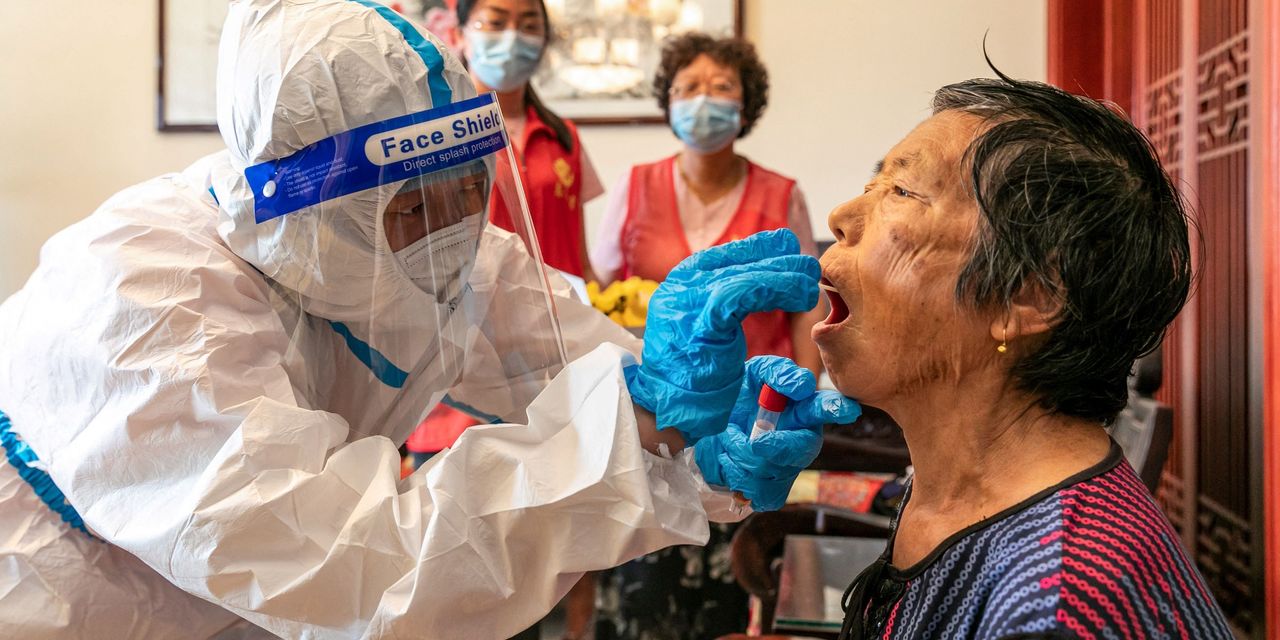The head of the International Monetary Fund on Tuesday joined the chorus of people urging China to adopt a more targeted approach to the coronavirus pandemic as the country’s zero-COVID policy sparks protests over lockdowns and hobbles the world’s second-biggest economy.
IMF Managing Director Kristalina Georgieva urged a “recalibration” of China’s tough “zero-COVID” approach, which is aimed at isolating every case, “exactly because of the impact it has on both people and on the economy,” as the Associated Press reported.
Georgieva made the comments in an interview with the AP on Tuesday, after protests erupted in Chinese cities and in Hong Kong over the weekend, marking the strongest public dissent in decades.
“We see the importance of moving away from massive lockdowns, being very targeted in restrictions,” Georgieva said Tuesday in Berlin. “So that targeting allows [China] to contain the spread of COVID without significant economic costs.”
Georgieva also urged China to look at vaccination policies and focus on vaccinating the “most vulnerable people.”
A low rate of vaccinations among the elderly is a major reason Beijing has had to resort to lockdowns, while the emergence of more-contagious variants has made it increasingly hard to halt the spread of the virus.
Chinese health officials said Tuesday they are preparing a push to get more older people vaccinated, the Guardian reported. The National Health Commission told reporters it would target more vaccinations at people older than 80 and would reduce to three months the gap between basic vaccination and booster shots for elderly people.
But experts, including President Joe Biden’s chief medical adviser, Anthony Fauci, have expressed concern that China’s homegrown vaccines are not effective enough. China has not yet approved the vaccines developed by Pfizer
PFE,
BioNTech
BNTX,
and Moderna
MRNA,
for public use. The shortcomings of China’s vaccines have led Chinese doctors to warn that a lifting of the zero-COVID policy could lead to a massive surge in cases that could overwhelm China’s healthcare system.
Now read: China’s strict zero-COVID policy isn’t worth the damage it does to its economy
Meanwhile, with police out in force, there was little news of protests in Beijing, Shanghai or other cities on Tuesday, the AP reported separately.
In the U.S., known cases of COVID are rising again, with the daily average standing at 41,755 on Monday, according to a New York Times tracker, up 6% from two weeks ago. Cases are rising in 22 states, as well as Guam and Washington, D.C., and are flat in Nebraska. They are rising fastest in Arizona, where they are up 82% from two weeks ago, followed by Michigan, where they are up 77%.
The daily average for hospitalizations is flat at 28,135, while the daily average for deaths is up 6% to 314.
Coronavirus Update: MarketWatch’s daily roundup has been curating and reporting all the latest developments every weekday since the coronavirus pandemic began
Other COVID-19 news you should know about:
• The World Health Organization has issued an emergency-use listing for the Novavax
NVAX,
protein-based COVID vaccine as a primary series for children ages 12-17 and as a booster for those ages 18 and older, Novavax said Tuesday. The WHO previously granted an emergency-use listing for the Nuvaxovid vaccine in adults ages 18 and older in December 2021, the company said. The new listing also paves the way for adults to get a booster shot of the vaccine about six months after completing the primary two-dose series.
• New Jersey Gov. Phil Murphy, a Democrat, said Monday his administration has launched a promised review of its handling of the pandemic, the AP reported. The administration hired regional law firm Montgomery McCracken Walker & Rhoads — which has offices in the state as well as Delaware, Pennsylvania and New York — along with management consulting firm Boston Consulting Group to conduct the review. The review is expected to end with a report in late 2023, the governor said.
• A Connecticut program that offered “hero pay” to essential workers at the peak of the pandemic got so many applicants that state lawmakers had to go back into session Monday to provide extra funding and put new limits on who could get the biggest bonuses, the AP reported. Initially, the state had expected to award about $30 million in bonuses to people who had to go to work, in person, in jobs in healthcare, food distribution, public safety and other essential services. But after getting 155,730 applications from eligible people, lawmakers realized they would have to either put more money in or slash benefits.
Here’s what the numbers say:
The global tally of confirmed cases of COVID-19 topped 641.8 million on Monday, while the death toll rose above 6.63 million, according to data aggregated by Johns Hopkins University.
The U.S. leads the world with 98.6 million cases and 1,079,477 fatalities.
The Centers for Disease Control and Prevention’s tracker shows that 228.4 million people living in the U.S., equal to 68.8% of the total population, are fully vaccinated, meaning they have had their primary shots.
So far, just 37.6 million Americans have had the updated COVID booster that targets the original virus and the omicron variants, equal to 12.1% of the overall population.
